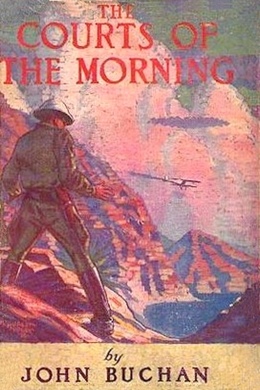
-
EPUB 466 KB
-
Kindle 579 KB
-
Support epubBooks by making a small $2.99 PayPal donation purchase.
This work is available for countries where copyright is Life+70 or less.
Description
South America is the setting for this adventure from the author of ‘The Thirty-nine Steps’. When Archie and Janet Roylance decide to travel to the Gran Seco to see its copper mines they find themselves caught up in dreadful danger; rebels have seized the city. Janet is taken hostage in the middle of the night and it is up to the dashing Don Luis de Marzaniga to aid her rescue.
556 pages with a reading time of ~8.50 hours (139058 words), and first published in 1929. This DRM-Free edition published by epubBooks, 2016.
Community Reviews
There are currently no other reviews for this book.
Excerpt
The open windows, protected by wire blinds as fine-meshed as gauze, allowed the cool airs from the sea to slip in from the dusk. The big restaurant was in a pleasant gloom broken by patches of candlelight from the few occupied tables. The Hotel de la Constitucion stands on a little promontory above the harbour of Olifa, so the noise of the streets comes to it only like the echo of waves from a breakwater. Archie Roylance, looking into the great square of velvet sky now beginning to be patterned by stars, felt as if he were still at sea.
The Vice-Consul interpreted his thoughts.
“You are surprised at the quiet,” he said. “That is only because we dine early. In a little there will be many lights and a jigging band and young people dancing. Yet we have good taste in Olifa and are not garish. If you will be my guest on another occasion, I will take you to a club as well quipped as any in Pall Mall, or to a theatre where you will see better acting than in London, and I will give you a supper afterwards which Voisin’s could not better. We have civilisation, you see–for what it is worth.”
The Vice-Consul, whose name was Alejandro Gedd, was a small man with a neat, dark, clean-shaven face, and high cheek-bones from which his critics deduced Indian blood.
As a matter of fact they came from another ancestry. His grandfather, Alexander Geddes, had come out in his youth from Dundee as a clerk in a merchant’s house, had prospered, married a pretty Olifera, begotten a son, and founded a bank which rose in the silver boom to fortune. That son had married a lady of pure Castilian descent, whose beauty was not equal to her lineage, so the grandson of old Geddes had missed both the vigour of the Scot and the suave comeliness of the Olifera. Don Alejandro was an insignificant little man, and he was growing fat. The father had sold his interest in the bank at a high figure, and had thereafter dabbled in politics and horse-breeding; the son, at his death, had promptly got rid of the stud and left the government of his country to get on without him. He had been sent to an English school, and later to the Sorbonne, and had emerged from his education a dilettante and a cosmopolitan. He professed a stout Olifa patriotism, but his private sentiment was for England, and in confidential moments he would speak of his life as exile. Already he had asked Archie a dozen questions about common friends, and had dwelt like an epicure on the recollections of his last visit–the Park on a May morning, an English garden in midsummer, the Solent in August, the October colouring of Scottish hills.
His dinner-jacket had been made in the vicinity of Hanover Square, and he hoped that his black stock and his black-ribboned eyeglass were, if not English, at any rate European.
Archie was looking at the windows. “Out there is the Pacific,” he said, “nothing nearer you than China. What is it like the other way?”
“The coastal plain for a hundred miles. Then the foothills and the valleys where the wine is made. A very pretty light claret, I assure you. Then, for many hundreds of miles, the great mountains.”
“Have you travelled there much?”
Don Alejandro shook his head. “I do not travel in this land. What is there to see? In the mountains there are nothing but Indians and wild animals and bleak forests and snow. I am content with this city, where, as I have said, there is civilisation.”
“A man I met on the boat told me about a place called the Gran Seco. He said it was bound to be soon the greatest copper area in the world.”
Don Alejandro laughed. “That ill-favoured spot becomes famous. Five years ago it was scarcely known. To-day many strangers ask me about it. The name is Indian-Spanish. You must understand that a hundred miles north of this city the coastal plain ends, and the Cordilleras swing round so that there is no room between them and the ocean.
